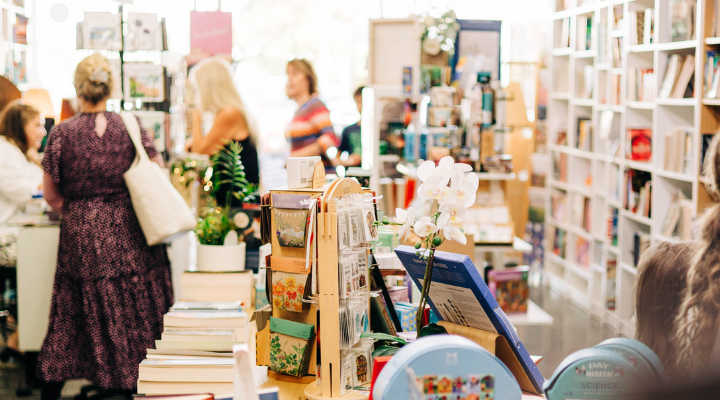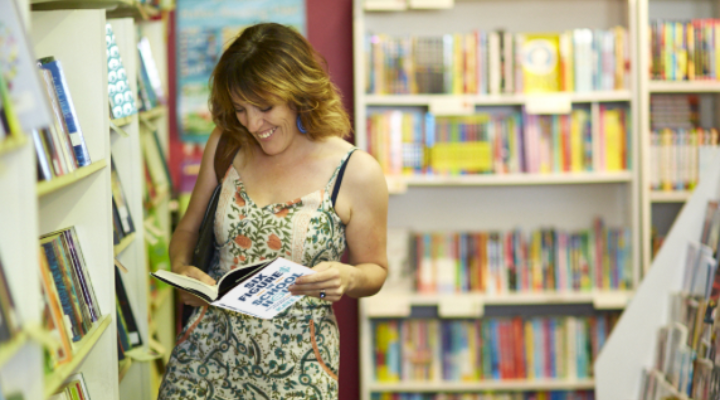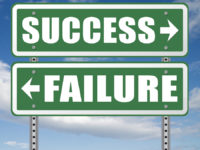Small-business owner Kate Toon shares what happened when she bought her local (struggling, tiny) bookstore.
“That’s the worst financial decision you could possibly ever make,” said my accountant. “You should definitely do it!”
Those were the fateful words that tipped me over the edge and firmed up my decision to buy a failing bookshop in a small coastal town.
I’d looked at the financials and they were terrible. The shop’s reputation was in the toilet. The shelves were bare and the interior was a tad grubby. Oh, and I had no retail experience at all (other than folding underpants in a men’s clothing store as a teenager).
Clearly, this was a dumb decision and everyone told me so. But I just felt in my gut that I could make it a success, and so far it’s (kind of) working.
But let me take a step back. For those who don’t know me, I’m a fairly established online entrepreneur, building my business in the copywriting and SEO space, before moving into passive income through digital products around eight years ago. Since then, I’ve built a multimillion dollar business from my backyard shed with relatively little effort.
Why I did it anyway
But after so many years of living in the online space, I had developed summit syndrome. My to-do list was ticked, the awards and accolades won, my bank account was juicy and quite honestly, I was bored. I was also missing human connection. After working at home for 15 years with no one but a small child and a furry dog for company, I felt cut off from community.
And then as I was walking on the beach gazing heavily at my naval my phone pinged with an email from the bookshop saying it would close within weeks if a buyer could not be found.
And so I bought it.
The rocky start
The early months were incredibly hard. First, there were the difficulties with the previous owner, while having to learn the ropes of running a bookshop. Then there were the extensive renovations, and, finally, the huge investment in restocking the shop. All this while caring for my father in the UK, who eventually passed away.
Meanwhile, the local community was suspicious. Who was this ‘fancy pants businesswoman’ coming in with her big ideas and her ‘changes’? Small communities do not like change. A negative social media campaign began, which was disheartening. But after years of dealing with online trolls, it was so much water off my ducky back.
To top it all off, we were losing money hand over fist. The shop had barely paid for itself for the previous years and the idea of making a profit was a distant dream!
And then the shift began.
The big rebrand
Using my digital marketing experience, I worked on rebranding with a fresh, friendly modern look that took us away from the stuffy elitist bookshop vibe.
Signage, books, decor and street appeal were our next project. We completely refurbished the front of the store with new lights, floors and window displays.
A new ecommerce website, updated socials, and comprehensive email marketing strategy with lead magnets and free resources.
Next we moved onto SEO, focusing on our local listings until we dominated for our chosen keywords. Partnerships were also crucial, working with the local coffee shop for offers, sponsoring local events and sports team, giving to charities, getting involved in local events.
How to make people visit a bookstore in 2025
Then we had to tackle the big problem. The reality is there’s absolutely no reason to buy a book from our shop, when you can order them on Amazon. And when the big stores can sell books for cheaper than we can buy them, we’re facing seemingly unsurmountable odds.
The only thing we can offer that they can’t? Community.
So we focused on revamping the rather limp exclusive loyalty program to make it open to all regulars, with generous 5 per cent cash rewards. We set up special days in the shop for kids, cheese and wine nights, author events and literary dinners. We created two separate book clubs for different demographics and set up a free regular story time.
The results? A warm, thriving, loyal community of advocates for the shop.
Our most powerful online tool has without a doubt been social media, mainly Instagram, but we’ll soon venture onto TikTok. We’ve built up our followers from below 1000 to nearly 5000, and also have a community on Facebook of nearly a 1,000 lovely local customers. Our mix of useful and ridiculous content has helped build brand awareness, with people travelling from Sydney just to visit our store.
The best way to make a small fortune in the bookshop trade is to start with a large one.
What about the money, you ask?
Well we’re getting there. We had a 37 per cent increase in revenue in the first year and (if you discount my initial investment) we broke even. But the truth is the best way to make a small fortune in the bookshop trade is to start with a large one. The bookshop currently could not survive without investment from my other business.
I hope to change that in this next financial year. We’ve settled into a rhythm, the store is well stocked, the staff are solid, the renovations are done. This is our year to just ‘do the same but a little better’ and see how we roll.

Besides, this was always going to be my give back project.
If it’s self-sustaining, it doesn’t need to set the world on fire financially. The payback is different: It’s in the four members of staff I employ, the safe place I’ve created in the community. This shop is for Barry, who comes in every Wednesday to buy thrillers, and Penny, who leaves her walker at the front counter and has a little chat, and for Cara, the tired mum who can flop in our kids area and read a story to her kids.
For me, owning the shop has taught me true wealth lies in people, not profits, and that moments matter much more than money.









